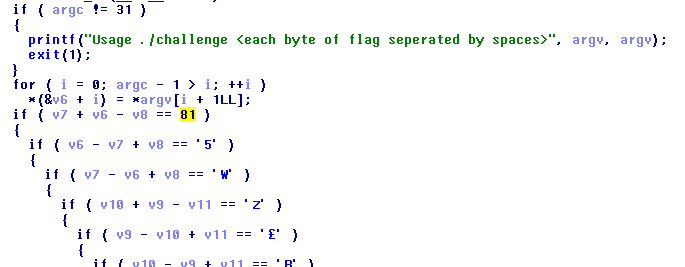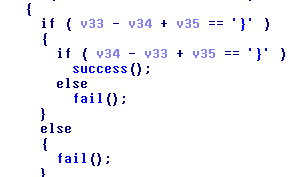backdoorctf 2017 - NoCalm Writeup
bySeptember 24, 2017

Decompiling the main function we see that each byte of the flag must be passed as argument to the program.
The number of arguments must be 31, as we can see from the first if statement.
The program check the correctness of the flag with a series of nested ifs and arithmetic stuffs.
If the flag is correct, it calls the success function, else it calls fail.

Using angr we can obtain the correct flag effortlessly.
import angr
import claripy
import simuvex
import resource
import time
proj = angr.Project('challenge', load_options={'auto_load_libs' : False})
fail = 0x004007CC
success = 0x004007B6
start = 0x004007E2
avoid = [fail]
end = [success]
argv = []
for i in xrange(31):
arg = claripy.BVS("input_string" + str(i), 8)
argv.append(arg)
state = proj.factory.entry_state(args=argv, remove_options={simuvex.o.LAZY_SOLVES,})
pg = proj.factory.path_group(state, veritesting=False)
start_time = time.time()
while len(pg.active) > 0:
print pg
pg.explore(avoid=avoid, find=end, n=1)
if len(pg.found) > 0:
print
print "Reached the target"
print pg
state = pg.found[0].state
flag = ""
for a in argv:
flag += state.se.any_str(a)[0]
print "FLAG: " + flag
break
print
print "Memory usage: " + str(resource.getrusage(resource.RUSAGE_SELF).ru_maxrss / 1024) + " MB"
print "Elapsed time: " + str(time.time() - start_time)
